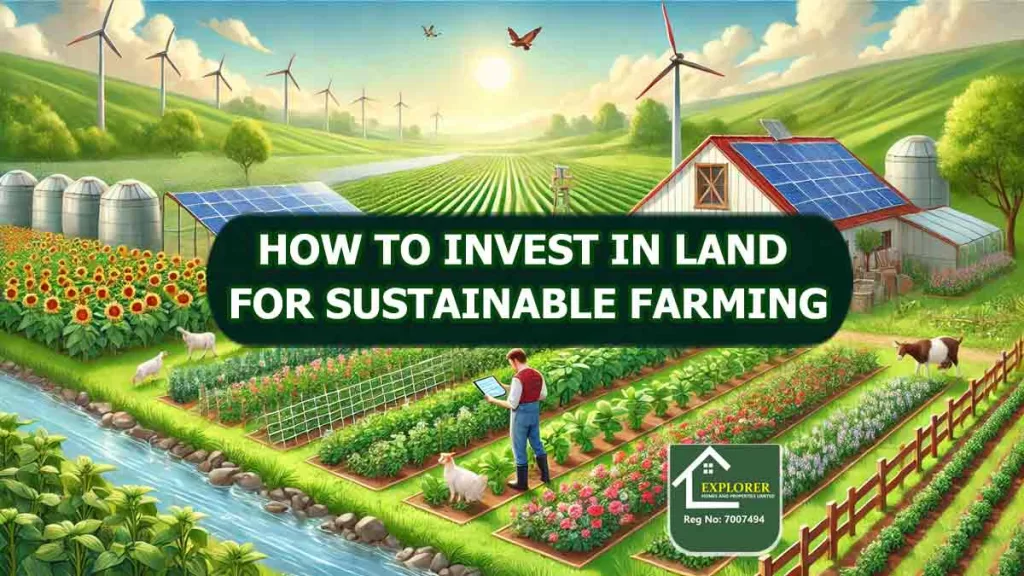Are you interested in farming and dreaming of a greener future? Buying land for sustainable farming can be a fulfilling way to live while also earning a steady income. This guide breaks down the key steps, tips, and benefits of farmland investment to help you make informed decisions and achieve success.
Why Consider Investing in Farmland?
Sustainable farming goes beyond just growing food; it’s about using resources responsibly and leaving the land better for future generations. Here’s why farmland investment makes sense:
- Rising Demand for Healthy Food: People are increasingly choosing organic and sustainably grown produce.
- Environmental Benefits: Sustainable farming protects soil, conserves water, and lowers carbon emissions.
- Long-Term Value: Unlike stocks, land often increases in value over time.
- Personal Satisfaction: Growing your own food and working with nature can be deeply rewarding.
Steps to Start Your Farming Journey
- Decide What You Want to Farm
- What type of farming are you interested in? This will guide your land choice:
- Crops: Vegetables, grains, or niche items like herbs.
- Livestock: Raising animals like goats, chickens, or cows.
- Mixed Farming: Combining crops and animals for variety and efficiency.
- Find the Right Location
- Picking the right area is key to your success. Look for:
- Good Soil: Fertile land supports healthy crops.
- Favorable Climate: Match the weather to what you plan to grow or raise.
- Reliable Water Sources: Nearby rivers, lakes, or wells are essential.
- Easy Access: Close to markets and roads to save on transportation costs.
- Check the Land’s Suitability
Carefully evaluate the land’s condition. Things to consider include:
- Soil type and quality.
- Risks like flooding or erosion.
- The area’s farming history.
- Understand Local Rules
Look into zoning laws and regulations for farming in the area. It’s important to know what activities are allowed on the land. Consulting a legal expert can help.
- Focus on Sustainable Practices
To farm sustainably, adopt eco-friendly methods such as:
- Crop Rotation: Helps maintain soil health and reduce pests.
- Natural Fertilizers: Boosts soil quality without harmful chemicals.
- Smart Water Use: Use drip irrigation or rainwater collection systems.
- Secure Funding and Buy the Land
Farmland can be expensive, but there are ways to fund your purchase:
- Apply for agricultural loans.
- Seek government grants for sustainable farming.
- Partner with other investors.
Cheap Land Properties For Sale In Epe-Lagos, Ota-Ogun State, Oyo-Ibadan, Imo State and Port-Harcourt
VIEW OUR LAND ALLOCATION TESTIMONIES

How to Make Your Farm Profitable
Once you own the land, here’s how to make the most of it:
1. Explore Multiple Income Sources:
- Rent out unused land to other farmers.
- Offer farm experiences like tours or workshops.
- Sell processed goods like honey or dried herbs.
2. Use Technology to Boost Efficiency:
- Use drones or sensors to monitor crops.
- Analyze data to improve yields and reduce waste.
3. Promote Your Farm:
- Build a website or social media presence to reach customers.
- Partner with local stores or community programs.
Why Sustainable Farming Is Worth It
Investing in sustainable farming isn’t just about making money. It’s about building something meaningful:
- Steady Income: Farming can provide consistent returns.
- Eco-Friendly Impact: Protects and enriches the environment.
- Community Benefits: Offers fresh food and creates jobs locally.
Get Started Today
Farming sustainably is an investment in your future and the planet. Whether you’re growing crops or raising animals, buying farmland gives you a chance to make a positive difference. Take the first step now by researching options, consulting experts, and preparing to cultivate success.
Your journey to a greener, more fulfilling future starts here. Make it happen today!

